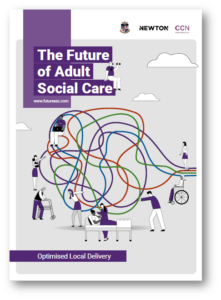New report: thousands of people could live more independently if councils continue to deliver social care
A new blueprint for delivering social care in England could help tens of thousands of adults each year who need care and support to live more independent lives – if councils are given the ability to reshape services through the government’s long-awaited reforms.
This is the key finding of a major new report launched today by CCN, Newton and the Association of County Chief Executives (ACCE). It argues strongly that social care should remain being delivered by local authorities rather than giving increased control to the NHS or central government.
 Download the full report here, and a summary here. Alongside the report, you can also visit a new interactive microsite for the project www.futureASC.com.
Download the full report here, and a summary here. Alongside the report, you can also visit a new interactive microsite for the project www.futureASC.com.
Following engagement with over 150 individuals across the social care sector, and built on an extensive new evidence base, Newton concludes that only councils, working with their partners – including the NHS and providers – can deliver their new wide-ranging blueprint for services that supports individuals to live as independently as possible.
The report is another piece of evidence to illustrate why social care should continue to be delivered by local authorities, rather than via the NHS. To showcase the importance of local delivery, the CCN launches its #KeepCareLocal campaign today.
CCN’s new video below contains an overview of Newton’s report and makes the case for keeping social care a service delivered by councils.
The report outlines new ways of working and improved practices for local authorities, care providers and the NHS in what Newton terms an ‘optimised local delivery model’ to help transform services for many of the 1.4m people who approach councils each year for local authority arranged-care in England.
This can be achieved through a mix of interrelated improvements, including better long-term commissioning of residential and home care; greater collaboration between councils, the NHS and care providers; investment in reablement services; maximising the use of the voluntary and community sector; and embracing digital transformation.
However, the report warns that this model can only be delivered if councils are given the clarity of a long-term funding model for care, due to be outlined in the government’s long–awaited green paper, and remain under local democratic control. The Local Government Association estimate that by 2025 there will be a funding gap in adult social care of £3.6bn just to maintain services.
The blueprint shows that, as part of a wider transformation that would improve services for many of those who need care and support, tens of thousands of individuals could live more independent lives every year. This would help deliver £1.6bn nationally in financial benefits per year from reducing care costs if councils are put in the driving seat to reform local services. This includes:
- At least 90,000 additional older adults each year could benefit from greater access to short-term services, such as reablement, to reduce or prevent their need for long-term-care. This, coupled with services being more effective, could reduce long-term care costs by £867m a year.
- Around one fifth – 10,800 – of older adults who go into long-term residential care each year could be supported to live in a more independent setting, such as their own home. This could reduce long-term care costs by £178m a year.
- Working age adults with learning disabilities outside of residential care receiving formal support could be enabled to develop the skills they need to live more independently. In turn, they could have their level of required home care support hours reduced by 8% on average – delivering £261m in savings per year.
- Around 11,600 working age adults with learning disabilities who currently live in residential care could be living in a more independent setting, such as in supported living or with a Shared Lives carer. This could deliver £74m a year of reduced costs.
- Greater collaboration between care providers and councils to tailor home care support around the individual, which maximises their potential for independence, could save £75m per year. At the same time, more use of voluntary and community sector services when adults approach social care could deliver a £95 million financial benefit per year.
But for service improvements to be realised, Newton outline several ‘foundations’ that must be in place through the government’s long-awaited social care reforms. These include setting out plans for a long-term funding solution for adult social care. Parity of esteem with the NHS is also called for, with social care getting a more prominent voice in local decision-making, and more campaigning to raise the positive profile of the sector with the public.
The report suggests reforms could also be underpinned by a new, outcomes-based performance framework. In exchange for more funding, the framework would make clear the impact of funding decisions, highlighting areas of good and poor practice, and give central government a new mechanism to monitor and support improvement.
 Cllr David Fothergill, health and social care spokesperson for the County Councils Network, said:
Cllr David Fothergill, health and social care spokesperson for the County Councils Network, said:
“This year, we could finally see the government’s long-awaited proposals for reforming care services in England. This must set out a long-term funding solution but also be clear over who is best placed to deliver services for the most vulnerable in our communities.
“The evidence presented in this report is compelling: only councils, who know their populations and their providers, have the means to deliver improved social care services to keep people independent for longer. Social care is best delivered as a local service and local authorities have the connection to their communities to truly transform local care for the better.
“This report recognises that if government finally delivers sustainable funding for councils, we can work with health partners and care providers to deliver improved commissioning and financial benefits which could be reinvested in local services.
“In exchange for more funding and local decision making over services, a new co-designed performance framework could also help provide reassurance to government that these improvements are being met.”
 Daniel Sperrin, director at Newton said:
Daniel Sperrin, director at Newton said:
“Through our experience we know that delivering adult social care is complex and multi-faceted. Crucially, it must recognise the local place and communities in which it operates.
“To create the optimised model, we have engaged with over 150 individuals – including those working in the delivery of social care – but also health leaders; providers of care; policy colleagues, digital experts; and crucially those with lived experience of social care.
“Each of their valuable contributions has resulted in the model described in the report, which we hope will offer leaders both locally and nationally the opportunity to consider their role in creating a future for adult social care which enables all individuals to live their best lives.”
 Rachael Shimmin, social care lead for the Association of County Chief Executives added:
Rachael Shimmin, social care lead for the Association of County Chief Executives added:
“Built on a shared understanding of the values and beliefs that should underpin our social care system, and an extensive new evidence base, Newton’s report provides a blueprint for how we can restart the debate on the future of adult social care.
“The Coronavirus pandemic has shone a light on the multiple challenges facing our social care system, but it has also bought with it a renewed emphasis on partnership and collaboration with health and care providers.
“It is this spirit of collaboration and improvement in which the future model of social care must be focused. This means retaining the critical role that councils play at the heart of the local care system, but most importantly, working with partners to enable people to live more independently for longer.
“We look forward to engaging government and the wider sector in exploring and implementing its findings over the coming period.”
